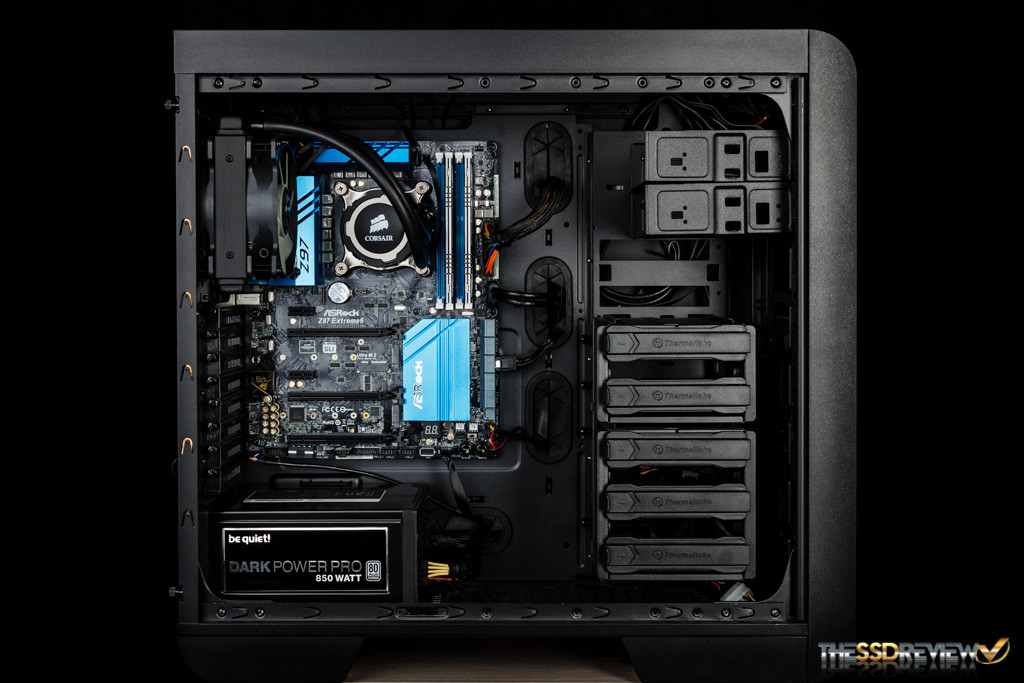TSSDR TEST BENCH AND PROTOCOL
SSD testing at TSSDR differs slightly, depending on whether we are looking at consumer or enterprise SSDs. For consumer SSDs, our goal is to test in a system that has been optimized with our SSD Optimization Guide. To see the best performance possible the CPU C states have been disabled, C1E support has been disabled, Enhanced Intel SpeedStep Technology (EIST) has been disabled. Benchmarks for consumer testing are also benchmarks with a fresh drive so, not only can we verify that manufacturer specifications are in line but also, so the consumer can replicate our tests to confirm that they have an SSD that is top-notch. We even provide links to most of the benchmarks used in the report.
SYSTEM COMPONENTS
This Test Bench build was the result of some great relationships and purchase; our appreciation goes to those who jumped in specifically to help the cause. Key contributors to this build are our friends at ASRock for the motherboard and CPU and be quiet! for the PSU and cooling fans. Also, a big thank you to Thermaltake for the case and Kingston for the RAM. We have detailed all components in the table below and they are all linked should you wish to make a duplicate of our system as so many seem to do, or check out the price of any single component. As always, we appreciate your support in any purchase through our links!
| PC CHASSIS: | Thermaltake Core V51 |
| MOTHERBOARD: | ASRock Z97 Extreme6 |
| CPU: | Intel Core i5-4670K |
| CPU COOLER: | Corsair H75 |
| POWER SUPPLY: | be quiet! Dark Power Pro 10 850W |
| SYSTEM COOLING: | be quiet! Silent Wings 2 |
| MEMORY: | Kingston HyperX Beast 2400Mhz |
| STORAGE: | Samsung 850 Pro |
| IRST DRIVER: | 13.1.0.1058 |
BENCHMARK SOFTWARE
The software in use for today’s analysis is typical of many of our reviews and consists of Crystal Disk Info, TRIMcheck, ATTO Disk Benchmark, Crystal Disk Mark, AS SSD, Anvil’s Storage Utilities, PCMark Vantage, and PCMark 8. We prefer to test with easily accessible software that the consumer can obtain, and in many cases, we even provide links. Our selection of software allows each to build on the last and to provide validation to results already obtained.
Crystal Disk Info is a great tool for displaying the characteristics and health of storage devices. It displays everything from temperatures, to the number of hours the device has been powered, and even to the extent of informing you of the firmware of the device.

Utilizing Crystal Disk Mark we can see that the OWC Mercury Electra 6G MAX does not support SMART data monitoring. We also see that TRIM is not listed under features, as expected. The firmware we will be conducting our testing on today is version N1007C.
We’ve covered TRIMcheck in the past. It is a great tool that easily lets us see if TRIM is actually functioning on a SSD volume in your system.

Based upon this test we confirm TRIM does not work with this SSD.
ATTO Disk Benchmark is perhaps one of the oldest benchmarks going and is definitely the main staple for manufacturer performance specifications. ATTO uses RAW or compressible data and, for our benchmarks, we use a set length of 256mb and test both the read and write performance of various transfer sizes ranging from 0.5 to 8192kb. Manufacturers prefer this method of testing as it deals with raw (compressible) data rather than random (includes incompressible data) which, although more realistic, results in lower performance results.

ATTO shows us some strong initial results with speeds higher than its rated specs. Peak speeds reached were 527MB/s for read and 494MB/s for write. So far, off to a good start!
 The SSD Review The Worlds Dedicated SSD Education and Review Resource |
The SSD Review The Worlds Dedicated SSD Education and Review Resource | 

What a pointless config. Not only this is more expensive to make, it’s slower than using a single controller.
They should have just went with Phison S10, which natively supports 2TB of storage and is faster than this.
From OWC Mercury Electra 6G I learned that ‘SSD’ actually stands for “Super Sudden Death”. I lost all my stuff, because it died right in the middle of backup. Thank you ‘OWC’. No more anything from OWC in my MBP 13″ late 2011. Never ever!